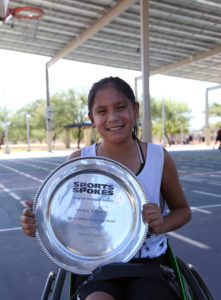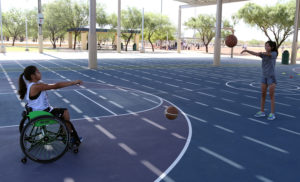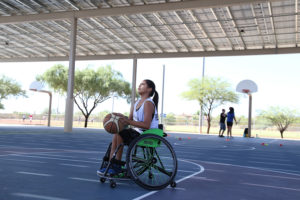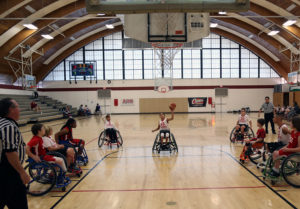For Adrina Castro, personal accountability means everything. From keeping current on her virtual schoolwork to maintaining physical readiness, the 12-year-old from Tucson, Ariz., is a major example for many to follow.
It’s in part because of her strong character and perseverance that Castro is the 2020 SPORTS ‘N SPOKES Junior Athlete of the Year.

Castro, who was born with spina bifida, enjoys sports and has played wheelchair basketball for nearly three years. She likes the intensity of the sport as much as the teamwork and skills needed to be successful, all of which have allowed her to excel as an athlete in a relatively short amount of time.
“I like the competitiveness, being able to travel and being part of a team,” Castro says. “I used to play able-body soccer but after my second spinal surgery, I didn’t get to play many sports until [I was] introduced to wheelchair basketball, and I just fell in love with the game.”
Family Helped Her
Castro is the 38th athlete to earn the SPORTS ‘N SPOKES Junior Athlete of the Year title. She will receive a one-year complimentary digital subscription to SPORTS ‘N SPOKES, a $1,500 educational scholarship and an engraved award.
“I didn’t even know that I was nominated until I won the SPORTS ‘N SPOKES Junior Athlete of the Year,” Castro says. “It really means a lot to me. My team nominated me, and I want to thank them for that. I’m so happy I got this award.”
She’s had to endure plenty of surgeries to play. When she was just 3 months old, Castro underwent a spinal-cord release surgery. Despite her birth defect, Castro lived a fairly typical childhood that allowed her a great deal of mobility, as well as the opportunity to participate in able-bodied soccer with her older sister, Mia, who is now 13.

But as Castro grew, her mobility started weakening and by age 7, she went in for a second spinal-cord release surgery. The second spinal-cord release surgery was little help and caused a loss of sensation in both legs. Castro’s feet started to turn inward, and she developed pressure sores as a result. Over two years, she had two skin grafts to close those sores on her left foot and a short time after that, doctors performed a procedure that moved the tendons in both feet to help her walk better. By the time she was 9, she had lost the ability to continue sports.
“She became depressed not being able to keep up with her sister anymore,” says Dee Castro, Adrina’s mother. “But being the awesome big sister that she is, Mia dragged her out of that depression by challenging her, working out with her and participating in adaptive sports together. I think her sister and the rest of the adaptive sports community have turned her into the athlete she’s become today.”
Earning Honors
Castro has turned her challenges into success. She’s built an impressive résumé of achievements so far that include the 2019 National Wheelchair Basketball Association (NWBA) Sportsmanship Award, the 2020 Pioneer Classic Sportsmanship Award and the 2020 DK3 Mamba Mentality Scholarship, along with the SPORTS ‘N SPOKES Junior Athlete of the Year award.

Castro’s on-the-court play caught the attention of the Arizona Storm during the 2019 Toyota NWBA National Wheelchair Basketball Women’s Tournament. Up to that point, she had only played three games with the juniors before being invited to play with the Storm.
“I think Adrina’s situation is unique from the time she first started,” says Castro’s father, Alex Castro. “She has been practicing five times a week, multiple times a day with juniors, D-I [Division I] and college teams. Tucson doesn’t really have a junior team, so the fact that she’s earned enough respect from the adults [to play] says a lot about the type of player she is.”
But it’s not the medals and trophies that drive her thirst to be the best.
“I feel that if you really want it, you should go for it,” Castro says. “Follow your dreams, even if you don’t believe you can.”
There was a time when Castro didn’t want to try wheelchair basketball out of fear she would feel awkward and isolated.
“Once I tried it, I felt normal and it was just awesome, and I always tell others to give it a try,” she says.
Despite the novel coronavirus pandemic (COVID-19) and cancellation of wheelchair sports across the country, Castro is putting in plenty of practice and preparing her body for competition.
“I’ve mostly been working out and trying to stay on top of things so that way if we do have a season, I’m already in shape,” Castro says.
Fortunately, she lives near an outdoor recreation center that offers a host of amenities, including a covered basketball court, where she can often be found honing her skills with Mia or Arizona Storm wheelchair
basketball teammate and U.S. Paralympic women’s wheelchair basketball team member Courtney Ryan.
“I train a lot with Courtney,” Castro says. “She’s fun to train with because she’s really competitive and even thought we mess around a little, I still get a lot out of it.”
Scholastically, Adrina is just as steadfast in her studies as she is at sports. Despite the pandemic’s restrictions and uncertainty of returning to the classroom this fall, she continues to put in the hard work to maintain her schoolwork, albeit virtually.
“Having no school has actually been really nice because I get to sleep in more,” says Castro, smiling. “But it’s more responsibility in order to keep on top of your studies. Normally, the teacher makes sure we have everything needed, but now we have to make sure. I think that’s good.”

Producing Change
Castro is a self-proclaimed math whiz, enjoys computer coding and hopes to one day work on creating special effects for the film industry or to make video games. Off the court, she enjoys drawing, playing video games and working out.
“A lot of people wonder why I train so hard at my age,” Castro says. “I tell them that if I want to be my best, I have to do what it takes and even though I have to train hard, I think it’s worth it just to be the player I want to be.”
Castro hosts the Instagram account itty_bitty_beastmode, where she offers training and workout advice, talks about living with spina bifida as a superpower and spreads positivity through visual storytelling.
“My best videos are my season videos where I show clips from throughout the season,” she says. “I use them to see how I did and what areas I need to work on. I go over the tapes while editing and think it’s good for me to see where I messed up or where I’m doing really good and see what areas I need to be better in or just to see what I’m getting good at.”
Her current mission is working to get the International Paralympic Committee to review and amend its 10-category coding system to include all athletes and all disabilities.
“There shouldn’t be such a thing as not disabled enough,” Castro says. “If they [athletes] have a diagnosed disability, they should play.”
One Response
We are so proud of Adrina for this and so many accomplishments through her commitment to wheelchair basketball. Southern Arizona Adaptive Sports provides Adrina and other youth with wheelchair and adaptive sports opportunities. Get in touch with us through our website and get out and play like Adrina!